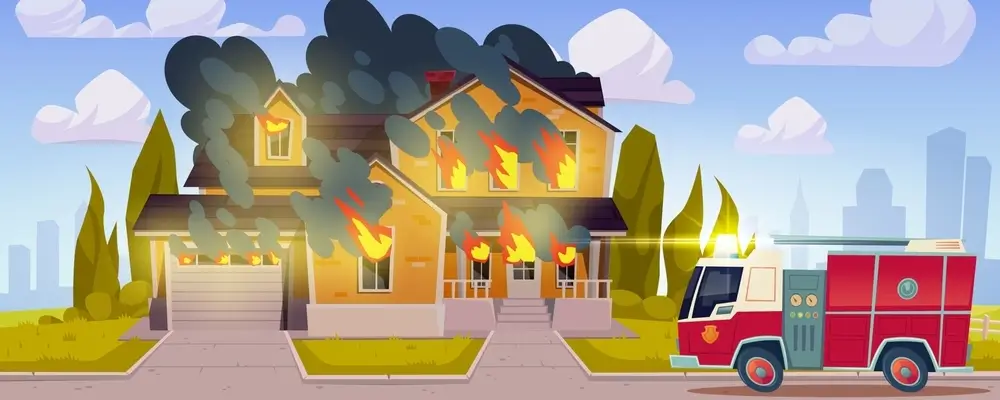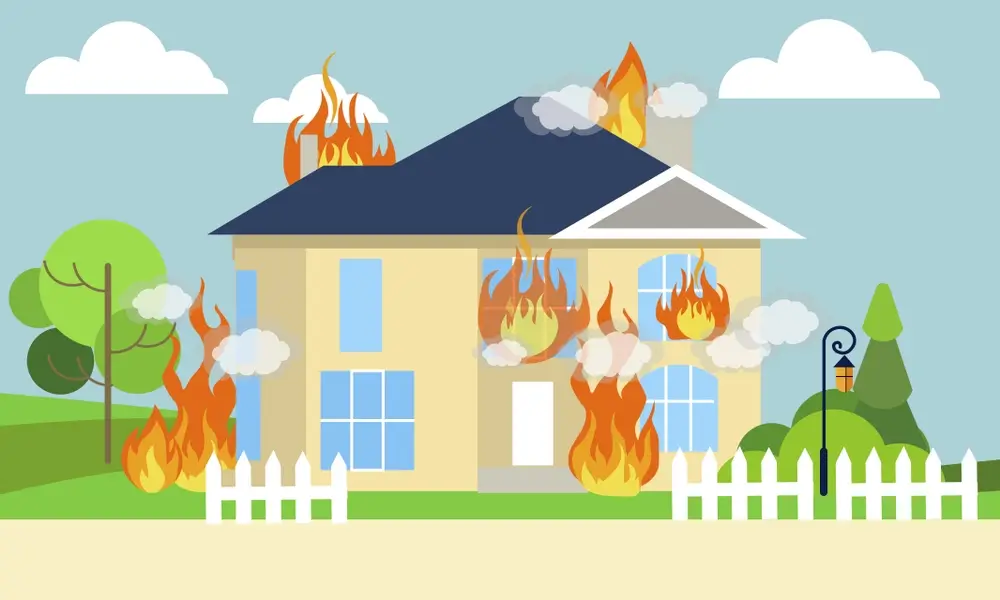The threat of fire in the home is a sobering reality, causing immeasurable damage and claiming lives every year. However, knowledge is power. This blog aims to equip homeowners and residents with actionable strategies to significantly minimize fire hazards within their dwellings.
We’ll cover vital topics like smoke alarm systems, escape route planning, kitchen safety protocols, and electrical best practices. Our aim is to facilitate a safer living environment for all, fostering informed decisions that safeguard both life and property.
Why Fire Safety At Home is Important?
Fire safety at home is of paramount importance for several compelling reasons, impacting not just the physical structure of a home but the safety and well-being of its occupants. Here are the key reasons why fire safety measures are essential:
- Protecting Lives: The most fundamental reason – fire safety saves lives! House fires can spread incredibly quickly, and smoke inhalation is just as deadly as the flames themselves. Proper fire safety measures like smoke alarms, escape plans, and safe practices drastically increase the chances of a safe escape and survival.
- Preserving Property: Fire causes devastating property damage. In seconds, hard-earned possessions, sentimental objects, and the home itself can be lost. Fire safety tactics help prevent these fires or at least minimize the damage they can do.
- Financial Protection: Fire damage brings a cascade of financial burdens – repairs, replacement of belongings, temporary housing if needed, and potentially increased insurance premiums. Minimizing fire risks also protects your financial resources.
- Protecting the Environment: Major house fires release harmful pollutants into the air and can contaminate the surrounding environment. Even contained house fires generate hazardous waste from burned materials. Preventing fires is a responsible action for the planet.
- Peace of Mind: Knowing your home is less vulnerable to fire and having a practiced plan of action reduces stress. This feeling of security and preparedness brings comfort and confidence.
- Community Safety: House fires aren’t just a personal problem. They place strain on emergency services like firefighters who bravely risk their lives for others. Each home fire prevented lessens that burden on your community.
Remember: House fires are often preventable. Don’t take fire safety for granted. By making it a priority, you’re not only protecting your family and home but also making a positive impact that extends to your community and environment.

Fire Accidents At Home Statistics
Here are some alarming fire accident statistics related to homes in the United States. These are primarily from the National Fire Protection Association (NFPA), the US Fire Administration, and similar reputable sources. Keep in mind that statistics can fluctuate slightly year to year.
Key Points
- Frequency: A fire department somewhere in the US responds to a home fire every 88-89 seconds.
- Deaths: Annually, between 2,500 and 3,000 civilians on average die in house fires. The majority of these deaths are caused by smoke inhalation.
- Injuries: Each year, around 11,000 – 12,000 civilians are injured in home fires.
- Damage: The estimated total property damage caused by house fires is in the billions of dollars every year.
- Leading Causes: The top causes of home fires are cooking-related, heating equipment, electrical malfunctions, intentional fires, and smoking.
More Specifics
- Approximately half of all home fires start in the kitchen.
- Older adults (65+) are disproportionately at risk of dying in house fires.
- Fires are more likely to occur in the evening and nighttime hours, with the most dangerous time being roughly between 5 pm and 8 pm.
- Lack of working smoke alarms is a factor in a significant number of fire deaths.
Important Note: These statistics are harrowing, but they underscore the importance of taking fire safety seriously. Simple precautions can make a big difference.
Sources

10 Fire Safety Tips At Home
Fire safety at home is crucial for protecting lives and property. Here are 10 fire safety tips to help ensure your home is prepared and your family knows what to do in case of a fire:
1. Smoke Alarms: Your First Line of Defense
- Install smoke alarms on every level of your home, including inside and outside of all bedrooms. For the hearing impaired, consider alarms with flashing lights.
- Test smoke alarms every single month. A helpful reminder could be to test them on the first day of each month. Replace batteries once a year or immediately if you hear a low battery “chirp.”
- Replace any smoke alarm that is over ten years old, as their effectiveness diminishes.
2. Escape Planning: Know Your Way Out
- Map out at least two escape routes from each room. Ensure windows and doors can be easily opened, and screens can be quickly removed.
- Designate a safe meeting place outside for your family, away from the house. Think of a neighbor’s yard or a recognizable landmark like a big tree.
- Practice the escape plan at least twice a year. Conduct drills during the day and also at night to simulate a fire occurring in darkness.
3. Candles: Ambiance with Responsibility
- Always place candles on secure, stable surfaces out of reach of children and pets. Keep them away from anything flammable like curtains, paper, or bedding.
- Consider flameless, battery-operated candles for a safer alternative, particularly in bedrooms.
- Extinguish candles completely before leaving the room, going to sleep, or if a draft is present.
4. Smart Cooking Practices
- Never leave cooking food unattended, especially when frying, grilling, or broiling. Stay focused!
- If a pan fire starts, never use water! Smother the fire with a lid or use a large quantity of baking soda or salt.
- Keep oven, stovetop, and toaster free from grease buildup. Clean spills as they happen.
5. Space Heaters: Safe Warmth
- Maintain a safe zone of at least three feet around space heaters, clear of furniture, drapes, bedding, or other combustibles.
- Never leave a space heater running unsupervised and always turn them off before going to bed.
- Consider newer models with automatic shut-off features if they tip over or overheat.
6. Electrical Vigilance
- Use outlets wisely! Don’t overload them with multiple high-power appliances. Unplug anything not in use.
- Inspect all cords frequently for fraying or cracking. Replace damaged cords immediately and never run them under rugs or furniture.
- If you experience frequent circuit breaker trips, flickering lights, or sparks, call an electrician. It could be a serious wiring issue.
7. Smoking Safety
- The safest practice is to smoke only outdoors. Use deep, sturdy ashtrays placed away from anything flammable.
- Never discard butts in potted plants, mulch, or leaves. Soak butts in water before putting them in the trash.
- Remind guests of your smoking rules and provide outdoor ashtrays for their convenience.
8. Matches & Lighters: Adult Tools Only
- Store matches and lighters up high, ideally in a locked cabinet, out of the reach and sight of children.
- Explain clearly to children that these items are not toys, and they are only for grown-ups to use for specific tasks.
9. Fire Extinguisher: Your Backup Plan
- Keep a multi-purpose fire extinguisher easily accessible. The kitchen is a good location, but check it regularly.
- Learn how to use your fire extinguisher properly. Remember the acronym PASS (Pull, Aim, Squeeze, Sweep).
- Know that a fire extinguisher is for small, contained fires. If a fire is spreading, evacuate immediately.
10. Evacuation is Key
- Don’t risk becoming a hero. If a fire breaks out, your top priority is getting yourself and your family out safely.
- Close doors behind you as you escape to help slow the fire’s spread.
- Once outside, don’t re-enter the burning building for any reason. Call the fire department from a neighbor’s house or cell phone.
Conclusion
Remember, fire prevention isn’t a one-time event. It’s a continuous mindset woven into your daily life. Review these safety tips regularly with your family, revisit your fire escape plan, and remain vigilant about eliminating potential hazards. These relatively small actions have the power to make a tremendous impact. With proactive fire safety measures, you take a significant step towards protecting the things you hold most dear – your family, your home, and your peace of mind.

